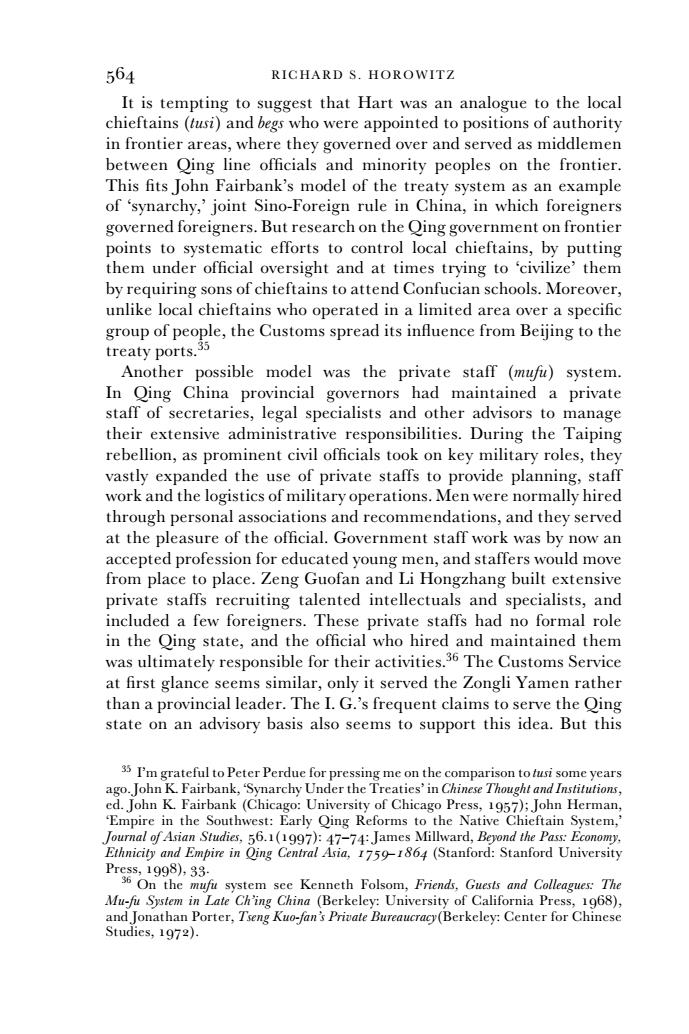正在加载图片...

564 RICHARD S.HOROWITZ It is tempting to suggest that Hart was an analogue to the local chieftains (tusi)and begs who were appointed to positions of authority in frontier areas,where they governed over and served as middlemen between Qing line officials and minority peoples on the frontier. This fits John Fairbank's model of the treaty system as an example of 'synarchy,'joint Sino-Foreign rule in China,in which foreigners governed foreigners.But research on the Qing government on frontier points to systematic efforts to control local chieftains,by putting them under official oversight and at times trying to 'civilize'them by requiring sons of chieftains to attend Confucian schools.Moreover, unlike local chieftains who operated in a limited area over a specific group of people,the Customs spread its influence from Beijing to the treaty ports.35 Another possible model was the private staff (mufu)system. In Qing China provincial governors had maintained a private staff of secretaries,legal specialists and other advisors to manage their extensive administrative responsibilities.During the Taiping rebellion,as prominent civil officials took on key military roles,they vastly expanded the use of private staffs to provide planning,staff work and the logistics of military operations.Men were normally hired through personal associations and recommendations,and they served at the pleasure of the official.Government staff work was by now an accepted profession for educated young men,and staffers would move from place to place.Zeng Guofan and Li Hongzhang built extensive private staffs recruiting talented intellectuals and specialists,and included a few foreigners.These private staffs had no formal role in the Qing state,and the official who hired and maintained them was ultimately responsible for their activities.36 The Customs Service at first glance seems similar,only it served the Zongli Yamen rather than a provincial leader.The I.G.'s frequent claims to serve the Qing state on an advisory basis also seems to support this idea.But this 35 I'm grateful to Peter Perdue for pressing me on the comparison to tusi some years ago.John K.Fairbank,'Synarchy Under the Treaties'in Chinese Thought and Institutions, ed.John K.Fairbank (Chicago:University of Chicago Press,1957);John Herman, Empire in the Southwest:Early Qing Reforms to the Native Chieftain System, Journal of Asian Studies,56.1(1997):47-74:James Millward,Beyond the Pass:Economy. Ethnicity and Empire in Qing Central Asia,1759-1864(Stanford:Stanford University Press,1998),33. On the mufu system see Kenneth Folsom,Friends,Guests and Colleagues:The Mu-fu System in Late Ch'ing China (Berkeley:University of California Press,1968) and Jonathan Porter,Tseng Kuo-fan's Private Bureaucracy(Berkeley:Center for Chinese Studies,1972).564 RICHARD S. HOROWITZ It is tempting to suggest that Hart was an analogue to the local chieftains (tusi) and begs who were appointed to positions of authority in frontier areas, where they governed over and served as middlemen between Qing line officials and minority peoples on the frontier. This fits John Fairbank’s model of the treaty system as an example of ‘synarchy,’ joint Sino-Foreign rule in China, in which foreigners governed foreigners. But research on the Qing government on frontier points to systematic efforts to control local chieftains, by putting them under official oversight and at times trying to ‘civilize’ them by requiring sons of chieftains to attend Confucian schools. Moreover, unlike local chieftains who operated in a limited area over a specific group of people, the Customs spread its influence from Beijing to the treaty ports.35 Another possible model was the private staff (mufu) system. In Qing China provincial governors had maintained a private staff of secretaries, legal specialists and other advisors to manage their extensive administrative responsibilities. During the Taiping rebellion, as prominent civil officials took on key military roles, they vastly expanded the use of private staffs to provide planning, staff work and the logistics of military operations. Men were normally hired through personal associations and recommendations, and they served at the pleasure of the official. Government staff work was by now an accepted profession for educated young men, and staffers would move from place to place. Zeng Guofan and Li Hongzhang built extensive private staffs recruiting talented intellectuals and specialists, and included a few foreigners. These private staffs had no formal role in the Qing state, and the official who hired and maintained them was ultimately responsible for their activities.36 The Customs Service at first glance seems similar, only it served the Zongli Yamen rather than a provincial leader. The I. G.’s frequent claims to serve the Qing state on an advisory basis also seems to support this idea. But this 35 I’m grateful to Peter Perdue for pressing me on the comparison to tusisome years ago. John K. Fairbank, ‘Synarchy Under the Treaties’ in Chinese Thought and Institutions, ed. John K. Fairbank (Chicago: University of Chicago Press, 1957); John Herman, ‘Empire in the Southwest: Early Qing Reforms to the Native Chieftain System,’ Journal of Asian Studies, 56.1(1997): 47–74: James Millward, Beyond the Pass: Economy, Ethnicity and Empire in Qing Central Asia, 1759–1864 (Stanford: Stanford University Press, 1998), 33. 36 On the mufu system see Kenneth Folsom, Friends, Guests and Colleagues: The Mu-fu System in Late Ch’ing China (Berkeley: University of California Press, 1968), and Jonathan Porter, Tseng Kuo-fan’s Private Bureaucracy(Berkeley: Center for Chinese Studies, 1972)